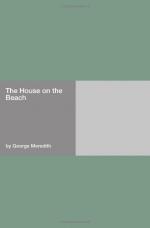“My wife talks too much,” said Crickledon.
When questioned by a gentleman, however, he was naturally bound to answer to the extent of his knowledge.
“What a funny old country it is!” Mr. Fellingham said to Annette, on their walk to the beach.
She implored him not to laugh at anything English.
“I don’t, I assure you,” said he. “I love the country, too. But when one comes back from abroad, and plunges into their daily life, it’s difficult to retain the real figure of the old country seen from outside, and one has to remember half a dozen great names to right oneself. And Englishmen are so funny! Your father comes here to see his old friend, and begins boasting of the Gippsland he has left behind. Tinman immediately brags of Helvellyn, and they fling mountains at one another till, on their first evening together, there’s earthquake and rupture— they were nearly at fisticuffs at one time.”
“Oh! surely no,” said Annette. “I did not hear them. They were good friends when you came to the drawingroom. Perhaps the wine did affect poor papa, if it was bad wine. I wish men would never drink any. How much happier they would be.”
“But then there would cease to be social meetings in England. What should we do?”
“I know that is a sneer; and you were nearly as enthusiastic as I was on board the vessel,” Annette said, sadly.
“Quite true. I was. But see what quaint creatures we have about us! Tinman practicing in his Court suit before the chiwal-glass! And that good fellow, the carpenter, Crickledon, who has lived with the sea fronting him all his life, and has never been in a boat, and he confesses he has only once gone inland, and has never seen an acorn!”
“I wish I could see one—of a real English oak,” said Annette.
“And after being in England a few months you will be sighing for the Continent.”
“Never!”
“You think you will be quite contented here?”
“I am sure I shall be. May papa and I never be exiles again! I did not feel it when I was three years old, going out to Australia; but it would be like death to me now. Oh!” Annette shivered, as with the exile’s chill.
“On my honour,” said Mr. Fellingham, as softly as he could with the wind in his teeth, “I love the old country ten times more from your love of it.”
“That is not how I want England to be loved,” returned Annette.
“The love is in your hands.”
She seemed indifferent on hearing it.
He should have seen that the way to woo her was to humour her prepossession by another passion. He could feel that it ennobled her in the abstract, but a latent spite at Tinman on account of his wine, to which he continued angrily to attribute as unwonted dizziness of the head and slight irascibility, made him urgent in his desire that she should separate herself from Tinman and his sister by the sharp division of derision.




